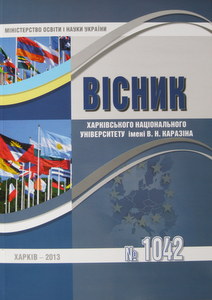Water resource potential of the world economy: problems of use and protection
Abstract
The paper considers water–resource potential of the world economy which is suggested to be thought of as the aggregate capacity of all freshwater sources, expressed in physical terms (cubic meters, cubic kilometers), or in money terms per unit time. Water–resource potential of the world economy is limited. Fresh water resources that with reasonable cost could be involved into economic use are close to depletion. Humanity already uses 1/10 of their total volume and more than 1/4 of the objectively available volume. Whereas deadweight losses of water account for more than 1/2 of its total consumption. Population growth, the rise of the productive forces and the improvement of quality of life in developing countries will lead to increase of water consumption norms for each their inhabitant of the planet. Hence, the need for water resources will increase and the possibility of meeting them will decline. There is a danger of complete depletion of the water resource potential of the world economy in 80–90 years. There is a global water problem caused by objective (spatial disparity in the water demand and its availability) and subjective (the development of wet industries, the limited use of in–plant recycling, pollution and depletion of water sources) reasons. Water transforms from the economic category into a political, causing international conflicts. It raises a question of training of diplomats– expert in the field of water law.
Downloads
References
Алексеев В. С. Совершенствование и развитие водного хозяйства региона / В. С.Алексеев. Под редакцией Э. В. Парахонского. – Вологда, 2001.– 448 с.
Вода – это политика [Електронний ресурс]. – Режим доступу : http://islam–today.ru/islam_v_mire/bliznij–vostok/voda–eto–politika/
Водное хозяйство. Советский энциклопедический словарь. – М. : Сов. Энциклопедия, 1980. – С. 234.
Джамалов Р. Г. Ресурсы подземных вод: их изменение под влиянием климата и распределение по странам мира / Р. Г. Джамалов, Т. И. Сафронова. – Инст. водных проблем. 2012. [Електронний ресурс]. – Режим доступу : hge.spbu.ru/download/paper/djamalov_resursy.pdf
Захаров В. П. Основы методики составления водохозяйственных балансов / В. П. Захаров, Ш. Ч. Чокин // Проблемы гидроэнергетики и водного хозяйства – 1964. – Вып. 2. – С. 3–39.
Зузик Д. Т. Водное хозяйство. БСЭ / Д. Т. Зузик, К. Г. Тихоцкий. – Т. 5. – М. Сов. энциклопедия, 1971.– С.177.
Крицкий С. Н. Методологические основы построения водохозяйственных балансов / С. Н. Крицкий, М. Ф. Менкель – Тр. Гидропроекта, М.–Л., 1964. – С.167–185
Левківський С. С. Раціональне використання і охорона водних ресурсів: підручник / С. С. Левківський, М. М. Падун – К. : Либідь, 2006. – 280 с.
Львович М. И. Вода и жизнь. Водные ресурсы, их преобразование и охрана / М. И. Львович. – М. : Мысль, 1986. – 254 с.
Максаковский В. П. Географическая картина мира / В. П. Максаковский. – М. : Дрофа, 2008. – 405 с.
Мировое водопотребление [Електронний ресурс]. – Режим доступу : http://www.microarticles.ru/article/vodnie–resyrsi–mira.html
Голиков А. П. Территориальная организация водного хозяйства СССР / А. П. Голиков. – Харьков : Вища школа. Изд-во при Харьковском университете, 1982. – 144 с.
Яворовский Ю. П. О некоторых экономических аспектах формирования отрасли «водное хозяйство» / Ю. П. Яворовский // Разработка и организация водоохранных мероприятий – 1973. – С. 99–105.
Water resources management [Electronic resource]. – Mode of access : http://www.unwater.org/topics/water–resources–management/en/
Статистическая информация. [Electronic resource]. – Mode of access : The World BankData http://data.worldbank.org/indicator. – Name from the screen.
Authors who publish with this journal agree to the following terms:
- Authors retain copyright and grant the journal right of first publication of this work under the terms of a license Creative Commons Attribution License 4.0 International (CC BY 4.0).
- Authors are able to enter into separate, additional contractual arrangements for the non-exclusive distribution of the journal's published version of the work (e.g., post it to an institutional repository or publish it in a book), with an acknowledgement of its initial publication in this journal.
- Authors are permitted and encouraged to post their work online (e.g., in institutional repositories or on their website) prior to and during the submission process, as it can lead to productive exchanges, as well as earlier and greater citation of published work.




